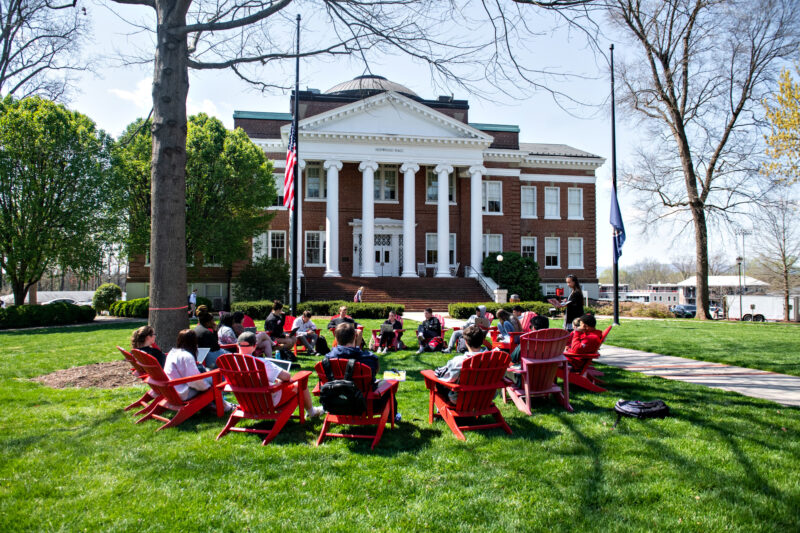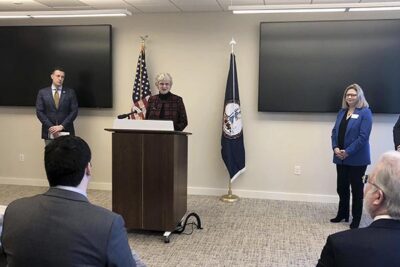
The Council of Independent Colleges in Virginia, also known as Virginia Private Colleges, announced today the findings of a monthslong economic analysis in a report titled, “The Economic Contributions that CICV’s Private Colleges and Universities Made to Virginia in Academic Year 2022-2023.”
This comprehensive study, executed by Mangum Economics, showcases the significant positive economic impact on the Commonwealth of Virginia by CICV’s 27 member institutions, including the University of Lynchburg. The report provides objective data supporting the vital economic contributions of nonprofit private colleges and universities. It describes the sector’s pivotal role in fostering educational access and community development across Virginia.
According to the Mangum report, the nonprofit private colleges and universities that comprise CICV employ nearly 30,000 and had $4.6 billion in overall economic output in the commonwealth in academic year 2023. Spending from these colleges and universities, out-of-state students, and out-of-state visitors directly and indirectly supported approximately $2 billion in associated wages and benefits and $157 million in state and local tax revenue.
For every 43 dollars invested by the state in the Virginia Tuition Assistance Grant program, the state and local tax return is $78, nearly 1:2. In academic year 2022-23, the state spent $86 million in $5,000 (on-campus) and $2,500 (online) awards.
The report’s author, Fletcher Mangum, who began his career at the State Council of Higher Education, wrote, “What [this] assessment has shown is that CICV’s member institutions are a critical component of Virginia’s coordinated higher education system. In addition to making a substantial economic and fiscal contribution to Virginia’s economy.
“They also play a valuable role in diversifying the options available to Virginia’s college-bound students, while at the same time contributing to the development of an educated citizenry and a skilled workforce at substantial savings to the taxpayer.”

CICV Vice Chair Dr. Mary Dana Hinton, president of Hollins University, emphasized the value of the VTAG investment, highlighting the substantial impact and cost-effectiveness of private education in Virginia.
“This report shows that the Virginia Tuition Assistance Grant investment of $86 million provides an excellent return, especially compared to the $1.6 billion spent on public higher education. The impact of VTAG is high, and the cost is low.”
The Mangum report reveals the rich demographic, economic, and geographic diversity of CICV’s member institutions. Notably, many are situated in regions with limited access to public four-year colleges, serving as vital educational resources. This includes “higher education deserts,” particularly in Southwest and Southern Virginia.
In Fall 2023, CICV’s private colleges and universities enrolled a higher proportion of African American and white, non-Hispanic students than their public counterparts, including significant numbers of in-state students from lower-income and middle-income households.
Three CICV members are designated minority-serving institutions, or MSIs: Hampton University and Virginia Union University are historically black universities — HBCUs — that formed after the Civil War, and Marymount University is Virginia’s only designated Hispanic-serving institution, or HSI.
As access institutions, including significant percentages of first-generation college students and federal Pell Grant-eligible students, CICV member institutions in Fall 2023 enrolled higher proportions of in-state students from lower-income and middle-income households than their public counterparts, while Virginia’s public four-year colleges and universities enrolled higher proportions of students from upper-income households than the CICV member institutions.
Because the private, nonprofit colleges and universities that make up CICV’s membership are often located in relatively small towns in areas of the state where employment opportunities are limited, they are frequently one of, if not the, most significant employer in their communities. Examples include:
- University of Lynchburg, Liberty University, and Randolph College located in the City of Lynchburg (2022 unemployment rate 3.9% vs. 2.9% statewide)
- Appalachian College of Pharmacy and Appalachian School of Law located in Buchanan County (2022 unemployment rate: 4.7% vs. 2.9% statewide)
- Averett University in the City of Danville (2022 unemployment rate: 4.6% vs. 2.9% statewide)
- Bluefield University located in Tazewell County (2022 unemployment rate: 4.2% vs. 2.9% statewide)
- Hampden-Sydney College in Prince Edward County (2022 unemployment rate: 3.9% vs. 2.9% statewide)
CICV Chair Dr. Alison Morrison-Shetlar, president of the University of Lynchburg, highlighted these institutions’ crucial role in their predominantly rural communities by providing employment opportunities and preventing higher education deserts.
“The contributions to the communities in which our institutions are located, and support of students is impressive indeed,” she said. “Without our institutions — especially in rural areas — there would be little to no employment opportunities and higher education deserts with no ability for local students to gain an education.”
The full report, an executive summary, and a fact sheet are available for review on CICV’s website. For more information, contact CICV President Christopher K. Peace at chris@cicv.org.
The Council of Independent Colleges in Virginia was founded in 1971 and currently operates as Virginia Private Colleges, a nonprofit 501(c)(6) organization representing 27 accredited nonprofit independent colleges and universities in Virginia. CICV is the collective voice of Virginia private higher education.

